

Power Triangle: Military, Security, and Politics in the Shaping of the Egyptian, Iranian, and Turkish Regimes. The dissertation explains why similar coup-installed regimes in Egypt (1952), Iran (1921), and Turkey (1923) developed along different political trajectories (authoritarianism, royal absolutism, and democracy, respectively).
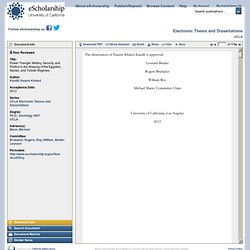
While most studies of regime change tend to underline popular forces, I demonstrate that these changes cannot be fully comprehended without a grasp of the shifting power balance within the ruling bloc. I argue that these divergent paths were determined by the ensuing power struggle between the military, security, and political institutions. Internal Memo 21581-2012. Dear (Redacted), Oh man, things went insane after you left your post a few days ago, but thankfully we got the situation under control, and we removed the old bag of bones and his henchman.

I can’t believe he wanted to stay as minister of defense after the decades he spent in his post and the insane things he made us go through the past year and a half.
The Politics of Security Sector Reform in Egypt. The Army and the Economy in Egypt. Egypt’s military given power to detain civilians days before presidential vote. CAIRO — The Egyptian government announced Wednesday that military police and intelligence officers have been given the right to detain civilians, a move that appears to reflect concern about the prospect of mass protests linked to the upcoming presidential election.
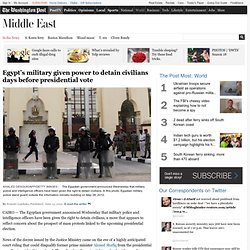
News of the decree issued by the Justice Ministry came on the eve of a highly anticipated court ruling that could disqualify former prime minister Ahmed Shafiq from the presidential runoff vote set for this weekend. The ruling has the potential to unleash widespread anger, particularly if Shafiq is not ruled ineligible under a law that bars senior officials who served under President Hosni Mubarak from political life for 10 years. The decree was dated June 4, meaning it was issued just four days after the expiration of Egypt’s infamous emergency law, which for decades gave the state broad powers to imprison Islamists and activists it said posed a threat to the ruling party. The Maspero Massacre: The Military, the Media, and the 1952 Cairo Fire as Historical Blueprint. Egypt's Other Revolution: Modernizing the Military-Industrial Complex. The Egyptian military produces a staggering array of manufactured goods: kitchen cutlery, flat-screen televisions, agricultural and household chemicals, refrigerators, industrial machinery, railway cars, and election booths.
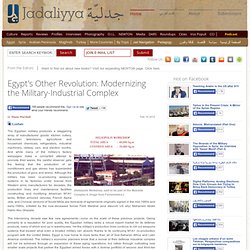
Carter: Tantawi in denial over "girl in the blue bra" Are there rebels in the Egyptian military? Time for an independent conversation. U.S. arming Egyptian military crackdown. When the Center for American Progress’ Think Progress blog recently compiled all of the inspiring foreign policy successes of our nation’s strong and resolute Commander-in-Chief, they listed — alongside the assassination of a U.S. citizen without due process and increased deference to Israel — what they hailed as the President’s having “supported democratic transition in Egypt.”
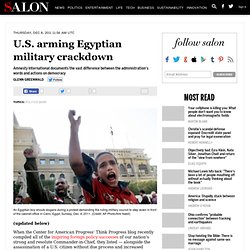
President Obama apparently deserves credit for this notwithstanding the fact that his administration supported President Mubarak up to the very last minute; Secretary of State Hillary Clinton, in 2009, proclaimed: “I really consider President and Mrs. Mubarak to be friends of my family”; and Obama, once Mubarak’s fall became inevitable, tried to engineer the empowerment of Omar Suleiman, Mubarak’s long-time trusted lieutenant most responsible for its torture, brutality and domestic repression. Obama's man in Cairo - Egyptian Protests. USA repeatedly shipped arms supplies to Egyptian security forces. Egypt’s Military Expands Power, Raising Alarms - NYTimes.com. A WikiLeaks cable shows how Egypt's regime has bought off the military. - By Sarah A. Topol. CAIRO—The lavish headquarters of Egypt's Ministry of Military Production is a far cry from the rundown buildings that surround it in central Cairo.
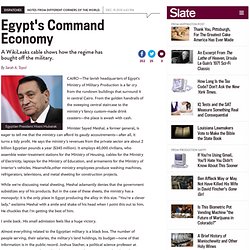
From the golden handrails of the sweeping central staircase to the ministry's fancy custom-made drink coasters—the place is awash with cash. Minister Sayed Meshal, a former general, is eager to tell me that the ministry can afford its gaudy accoutrements—after all, it turns a tidy profit. He says the ministry's revenues from the private sector are about 2 billion Egyptian pounds a year ($345 million). The History of Military Dictatorship in Egypt. Military Rule In Egypt Timeline. Year of the SCAF: a Timeline of Mounting Repression. [Jadaliyya Egypt Editors’ note: This post was originally published on 17 December 2011, under the title "SCAF: A History of Injustice".
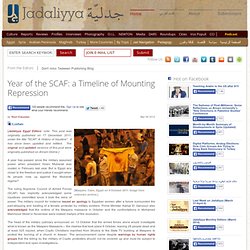
It has since been updated and retitled. The original and updated versions of this post were originally published on Ahram Online.] A year has passed since the military assumed power when president Hosni Mubarak was ousted in February last year. But is Egypt any closer to the freedom and justice it sought when its people rose up against the Mubarak regime? The vast and complex military machine will decide its nation’s future - Africa - World. Since it started in the late 1970s, US military aid to Egypt has totalled a staggering $40bn (£24.9bn).
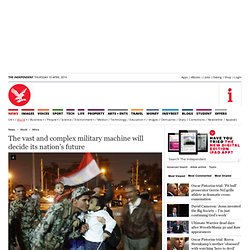
It is now charged, since the collapse yesterday of the 30-year-old Mubarak regime, with running the country. Some 40 per cent of troops are conscripts, suggesting that, despite its size, and its influence over Egyptian society, it is yet to make the transition to being a professional military force. Egypt’s military barrier to democracy.